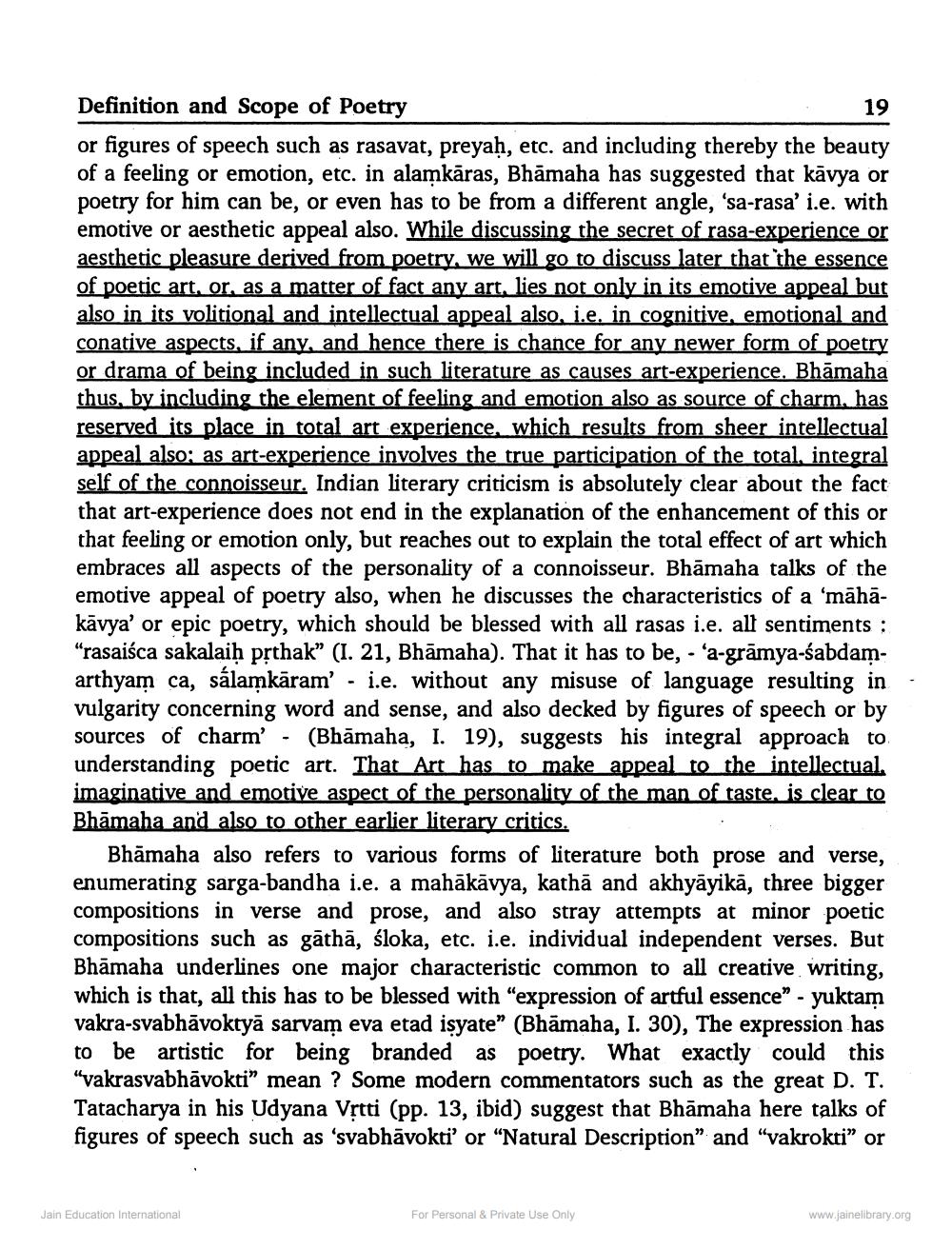________________
Definition and Scope of Poetry
19
or figures of speech such as rasavat, preyaḥ, etc. and including thereby the beauty of a feeling or emotion, etc. in alamkāras, Bhāmaha has suggested that kāvya or poetry for him can be, or even has to be from a different angle, 'sa-rasa' i.e. with emotive or aesthetic appeal also. While discussing the secret of rasa-experience or aesthetic pleasure derived from poetry, we will go to discuss later that the essence of poetic art, or, as a matter of fact any art, lies not only in its emotive appeal but also in its volitional and intellectual appeal also, i.e. in cognitive, emotional and conative aspects, if any, and hence there is chance for any newer form of poetry or drama of being included in such literature as causes art-experience. Bhāmaha thus, by including the element of feeling and emotion also as source of charm, has reserved its place in total art experience, which results from sheer intellectual appeal also; as art-experience involves the true participation of the total, integral self of the connoisseur. Indian literary criticism is absolutely clear about the fact that art-experience does not end in the explanation of the enhancement of this or that feeling or emotion only, but reaches out to explain the total effect of art which embraces all aspects of the personality of a connoisseur. Bhāmaha talks of the emotive appeal of poetry also, when he discusses the characteristics of a 'māhākavya' or epic poetry, which should be blessed with all rasas i.e. all sentiments : "rasaiśca sakalaiḥ pṛthak" (I. 21, Bhāmaha). That it has to be, - 'a-gramya-sabdamarthyam ca, sálamkaram' i.e. without any misuse of language resulting in vulgarity concerning word and sense, and also decked by figures of speech or by sources of charm' (Bhāmaha, I. 19), suggests his integral approach to understanding poetic art. That Art has to make appeal to the intellectual. imaginative and emotive aspect of the personality of the man of taste. is clear to Bhāmaha and also to other earlier literary critics.
-
Jain Education International
-
Bhamaha also refers to various forms of literature both prose and verse, enumerating sarga-bandha i.e. a mahākāvya, kathā and akhyāyikā, three bigger compositions in verse and prose, and also stray attempts at minor poetic compositions such as gāthā, śloka, etc. i.e. individual independent verses. But Bhāmaha underlines one major characteristic common to all creative writing, which is that, all this has to be blessed with "expression of artful essence" - yuktam vakra-svabhāvoktyā sarvam eva etad iṣyate" (Bhāmaha, I. 30), The expression has to be artistic for being branded as poetry. What exactly could this "vakrasvabhāvokti" mean? Some modern commentators such as the great D. T. Tatacharya in his Udyana Vṛtti (pp. 13, ibid) suggest that Bhāmaha here talks of figures of speech such as 'svabhāvokti" or "Natural Description" and "vakrokti" or
For Personal & Private Use Only
www.jainelibrary.org




